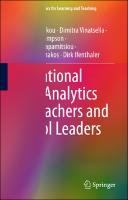Educational Data Analytics for Teachers and School Leaders
| dc.contributor.author | Mougiakou, Sofia | |
| dc.contributor.author | Vinatsella, Dimitra | |
| dc.contributor.author | Sampson, Demetrios | |
| dc.contributor.author | Papamitsiou, Zacharoula | |
| dc.contributor.author | Giannakos, Michail | |
| dc.contributor.author | Ifenthaler, Dirk | |
| dc.date.accessioned | 2022-11-18T14:19:01Z | |
| dc.date.available | 2022-11-18T14:19:01Z | |
| dc.date.issued | 2023 | |
| dc.identifier | ONIX_20221118_9783031152665_6 | |
| dc.identifier | OCN: 1349357930 | |
| dc.identifier.uri | https://library.oapen.org/handle/20.500.12657/59313 | |
| dc.description.abstract | Educational Data Analytics (EDA) have been attributed with significant benefits for enhancing on-demand personalized educational support of individual learners as well as reflective course (re)design for achieving more authentic teaching, learning and assessment experiences integrated into real work-oriented tasks. This open access textbook is a tutorial for developing, practicing and self-assessing core competences on educational data analytics for digital teaching and learning. It combines theoretical knowledge on core issues related to collecting, analyzing, interpreting and using educational data, including ethics and privacy concerns. The textbook provides questions and teaching materials/ learning activities as quiz tests of multiple types of questions, added after each section, related to the topic studied or the video(s) referenced. These activities reproduce real-life contexts by using a suitable use case scenario (storytelling), encouraging learners to link theory with practice; self-assessed assignments enabling learners to apply their attained knowledge and acquired competences on EDL. By studying this book, you will know where to locate useful educational data in different sources and understand their limitations; know the basics for managing educational data to make them useful; understand relevant methods; and be able to use relevant tools; know the basics for organising, analysing, interpreting and presenting learner-generated data within their learning context, understand relevant learning analytics methods and be able to use relevant learning analytics tools; know the basics for analysing and interpreting educational data to facilitate educational decision making, including course and curricula design, understand relevant teaching analytics methods and be able to use relevant teaching analytics tools; understand issues related with educational data ethics and privacy. This book is intended for school leaders and teachers engaged in blended (using the flipped classroom model) and online (during COVID-19 crisis and beyond) teaching and learning; e-learning professionals (such as, instructional designers and e-tutors) of online and blended courses; instructional technologists; researchers as well as undergraduate and postgraduate university students studying education, educational technology and relevant fields. | |
| dc.language | English | |
| dc.relation.ispartofseries | Advances in Analytics for Learning and Teaching | |
| dc.subject.classification | thema EDItEUR::J Society and Social Sciences::JN Education | en_US |
| dc.subject.classification | thema EDItEUR::P Mathematics and Science::PB Mathematics::PBT Probability and statistics | en_US |
| dc.subject.other | Educational Data Analytics | * |
| dc.subject.other | Learning Analytics | * |
| dc.subject.other | Teaching Analytics | * |
| dc.subject.other | Instructional design | * |
| dc.subject.other | Evidence based education | * |
| dc.subject.other | Teachers' competence | * |
| dc.subject.other | Textbook | * |
| dc.title | Educational Data Analytics for Teachers and School Leaders | |
| dc.type | book | |
| oapen.identifier.doi | 10.1007/978-3-031-15266-5 | |
| oapen.relation.isPublishedBy | 6c6992af-b843-4f46-859c-f6e9998e40d5 | |
| oapen.relation.isFundedBy | 80d60b09-41f1-44d0-b62b-36559435e05f | |
| oapen.relation.isbn | 9783031152665 | |
| oapen.imprint | Springer International Publishing | |
| oapen.pages | 238 | |
| oapen.place.publication | Cham | |
| oapen.grant.number | [...] |

